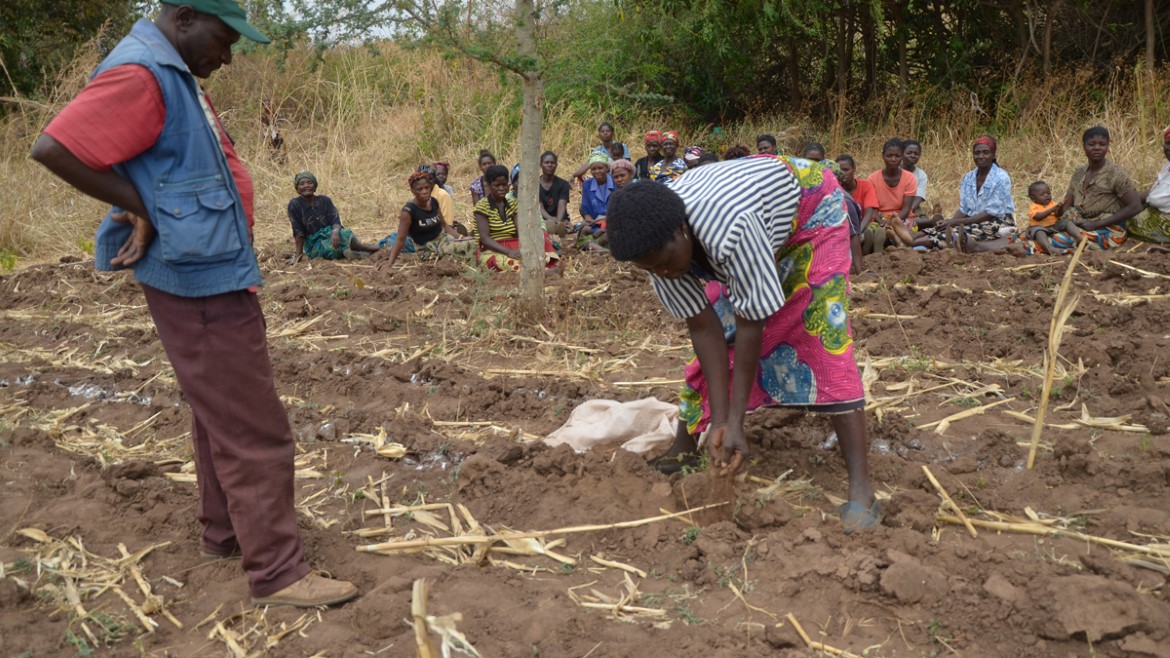
Agriculture and food security
Altogether 70 percent of those living in extreme poverty worldwide live in rural areas.
Smallholder farmers produce 80 per cent of the food consumed in Southern Asia and Sub-Saharan Africa. Nevertheless, small-scale food producers today account for over half of the people worldwide suffering from food insecurity today.
The situation today
The number of hungry people worldwide is continuing to decline. The Millennium Development Goal of halving the proportion of people suffering from hunger was almost have achieved by the end of 2015. Totally 72 out of 129 developing countries have reached this goal according to an FAO report. Nevertheless, the positive development is unevenly distributed and approximately 800 million people in the world is still suffering from hunger and undernutrition.
Stable political conditions, including economic growth and social protection of the most vulnerable, are crucial factors in achieving food security. Increased productivity for small-scale food producers, well-functioning markets and trade are highlighted as important aspects that can lead to changes for the better.
Norway’s support to agricultural development is therefore broadly based and includes global and regional processes as well as institutions and national programmes.
Climate-smart agriculture
Agriculture and food production are vulnerable to climate change. Increased temperatures, changed precipitation patterns and more frequent occurrences of extreme weather events pose an ever-growing threat to local and global food security.
Climate-smart agriculture emphasizes increases in agricultural productivity and income for the farmers. and at the same time greater resilience to future climate change impacts.. Where possible, measures are adopted to reduce emissions of greenhouse gases from agriculture. Norway supports several different programmes for climate-smart agriculture, both bilaterally and through collaboration with relevant international organizations.
Conservation Agriculture (CA) is a method of cultivation where the soil is not tilled but planting takes place directly in the ground. This reduces CO2 emissions and preserves soil nutrients.
CA is recognized as one example of a climate-smart intervention, and is now, with Norwegian support, spreading across Africa. The technique is already well established in parts of Brazil.
Biodiversity and genetic resources
Biodiversity is essential for guaranteeing food security.
To ensure that agriculture is able to adapt to changed growing conditions resulting from changes in temperature and precipitation, plant breeding – the development of new types of cultivated plants – is becoming increasingly important.
Genetic variation is most important as raw material for plant breeding. Therefore, it is crucial to safeguard both the diversity of cultivated species and of their closest wild relatives.
Preservation of biological diversity and genetic variation is invaluable in adapting cultivated plants to new and harsher conditions.
Norway has invested heavily in biodiversity and is recognised for this work. The Svalbard Global Seed Vault is unique in this respect. However, but much is also being done to preserve plants in their natural habitats.he protection of forests might, for example, be vital in safeguarding food production.
Support to regional processes
Regional processes can both influence and support national authorities and may lead to a dialogue with other countries with the same challenges.
Norway supports regional institutions and processes such as the African Union (AU), the New Partnership for Africa’s Development (NEPAD) and the Comprehensive Africa Agriculture Development Programme (CAADP) because these institutions are anchored in Africa and have a regional perspective.
Such regional gatherings make it possible to compare, collaborate and exchange experiences differently compared with global mechanisms. In addition, this provides stronger consensus and greater confidence when meeting potential donors and setting own priorities.
Through NEPAD, Norway also supports a regional, climate-smart agricultural programme whereby NEPAD attempts to influence several African countries to change and adapt their production systems.
Research
Research is a significant factor in the work to ensure that there is sufficient, nutritious food worldwide.
The Consultative Group for International Agricultural Research (CGIAR) is a key player vis-à-vis research in developing countries. The group examines production systems as a whole and has a coherent, interdisciplinary approach to agricultural development.
Research is vital in adapting tropical agriculture to climate change by breeding new, climate-adapted types and varieties of today’s most important food crops. One example is the breeding of plants that are salt-tolerant or that embody other climate- resistant properties from wild relatives of the local varieties.
This is of importance because the UN’s Climate Panel states in its Fifth Assessment Report in 2014 that food production in tropical countries may be greatly reduced due to climate change as well as to the increase in the world’s population, resulting in a greater need for food globally.
Research programmes should therefore have the aim of reducing rural poverty, improving food security, enhancing health and nutrition and sustainable use of natural resources.
International work for food security
FAO’s Committee for Food Security (CFS) is the central political platform for global food security and the right to food and nutrition. Norway is an active member of this committee.
The aim of the committee is to unite all actors in the food security arena to strengthen collaboration and improve the strategic coordination of measures at all levels.
